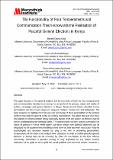The Functionality of Four Temperaments and Communication Theories towards the Realisation of Peaceful General Elections in Kenya
Publication Date
2012Author
Benard Odoyo Okal, Beverlyne Asiko Ambuyo, Deborah Nanyama Amukowa
Metadata
Show full item recordAbstract/
The paper focuses on the general analysis and functionality of both the four temperaments
and communication theories in an attempt to comprehend the process, nature and reality of
politics, campaigns and general elections in Kenya. Temperaments theory classifies human
personalities into four major categories: sanguine, choleric, melancholic and phlegmatic. The
paper proposes to highlight how having clear knowledge of these personalities in the political
contexts may help the general public in electing peacemakers. The paper also puts into focus
how aspects of communication theory especially speech event and speech act theories may be
used in understanding our political scenes. The speech event has been used to summarize the
nature of politics in Kenya while speech act theory shows how political utterances can be
misjudged by the audience hence fuelling untold violence, hate and even mass action. May be
psychologists and discourse experts can play a key role in describing personalities,
temperaments of the leaders and analyze their utterances in order to realize peaceful general
elections in Kenya that can be emulated by other African leaders in the East African
community. Remember, a peaceful country is very important for any citizen towards
realization of its goals so as to uplift the social, political and economic sectors. However, a country cannot have peaceful atmosphere if the populace seems to be divided into ethnic lines,
jobs given through nepotism and general national developments lopsided. It is a common
phenomenon in Kenya that before, during and after general elections, violence generally
occurs. Is it temperaments of the leaders or their utterances during campaigns that
contribute to violence?

